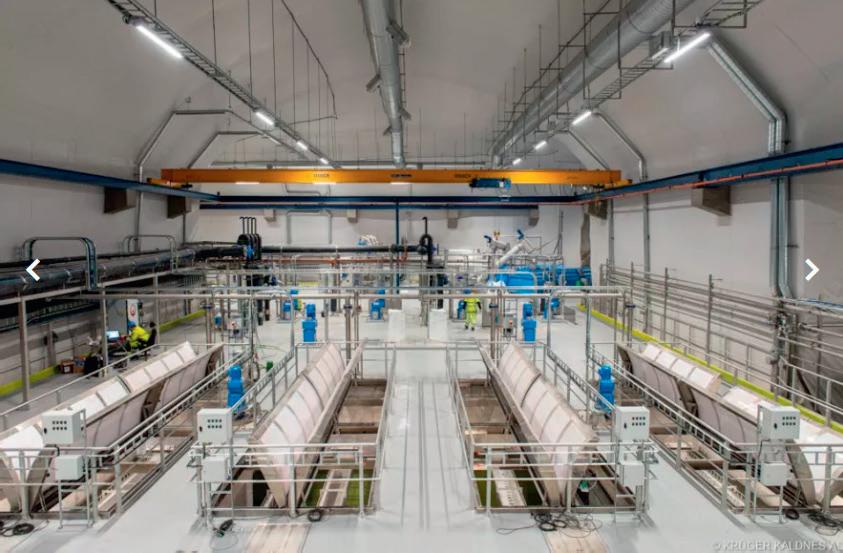
6 minute read
Training and Careers
Distanced learning
Despite the challenges of the pandemic, training in aquaculture continues to be a popular choice
Last month, two aquaculture trainees were recognised for their achievements at Lantra Scotland’s ALBAS 21 (Awards for Land-based and Aquaculture Skills) event.
Callum Duggan, a freshwater technician with Cooke Aquaculture, won the Aquaculture Learner of the Year category, a pres� gious CARAS award and was the ALBAS Overall Runner-up. Guy Tindall, a marine senior husbandry technician with Grieg Seafood Shetland, was Aquaculture Learner of the Year Runner-up.
Callum Duggan has been studying through a Modern Appren� ceship SVQ Level 7 (HNC) in Aquaculture, through the NAFC Marine Centre. He said: “I was surprised and grateful to be nominated for an ALBAS. I’m relishing my current role helping run the site, as I’ve always been interested in fi sh management. I really enjoy my role and take sa� sfac� on from the site running smoothly, with progress and improvements being made.”
Lantra is a charity working to ensure that the UK’s land-based, aquaculture and environmental conserva� on sector a� racts and supports the skilled new entrants and workers that it needs.
Dr Liz Barron-Majerik MBE, Director of Lantra Scotland, says that training during the Covid-19 pandemic has been challenging for trainees and providers, but aquaculture con� nues to generate a lot of interest as a career.
She says: “Aquaculture is unique among our sectors though, in that there is no college based, full � me course that prepares candidates for work in Aquaculture, which has pros and cons. It can be hard for new entrants to know what to expect, but on the plus side, they are earning while they are learning, and that is very a� rac� ve indeed. So essen� ally all new entrants (unless they have studied outside of Scotland) learn on the job and are supported by the company training programme through programmes such as the Modern Appren� ceship and the rela� vely new Technical Appren� ceship.
“The la� er in par� cular is a great way to support and retain those within Aquaculture, and in the future I would like to see higher level appren� ceships on off er to other sectors such as Agriculture and Forestry. Certainly Aquaculture is leading the way in this regard!”
She adds: “There is certainly an interest in careers in this sector, but as with some of the other sectors that we support, we need more! This is why we are keen for more of those working in the sector to register as STEM Ambassadors, so that every school can access informa� on about the sector and the diverse range of skills that the Aquaculture industry needs.”
The Ambassadors’ role is to bring their sector to life talking about everyday experiences at careers events, classroom lessons, STEM-focused events and workshops for teachers and career infl uencers.
Barron-Majerik adds: “We also have our own fantas� c Aquaculture Industry Champions who are helping us spread the word and we have created an interac� ve careers map (at www. scotland.lantra.co.uk/careers/sector/331/aquaculture) to help those considering a career to fi nd out more about the op� ons available.”
Stuart Cannon is Managing Director and Owner of Kames Fish Farming, a trout farmer on the west coast of Scotland. He says training for staff at Kames has con� nued through the pandemic, albeit with extra challenges.
He explains: “There have been some diffi cul� es, for example indoor classes were cut and more training had to take place online. Boat training has been OK, generally.”
Training is not just for new recruits – at a farm site, staff need to renew their training, typically every four to fi ve years, and there is some concern that if regular updates have been delayed, training when it comes could require more � me and therefore cost more.
Recruitment has not been a problem over the past year, Cannon says: “It’s been good – salaries in the sector are a� rac� ve. The work is hard and it can mean long hours during a harvest, but the staff are willing!”
The NAFC Marine Centre, based at Scalloway,




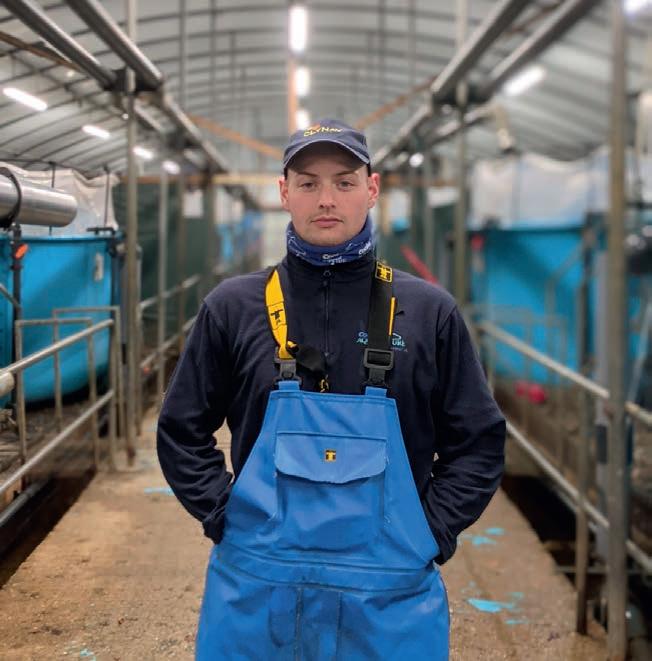
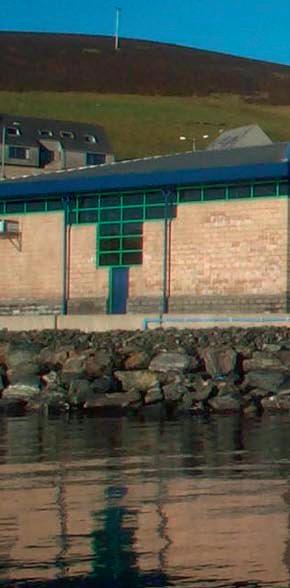
Left: Callum Duggan Opposite from top: NAFC; Guy Tindall; Kruger Kaldnes had a great response to its call for engineering applicants
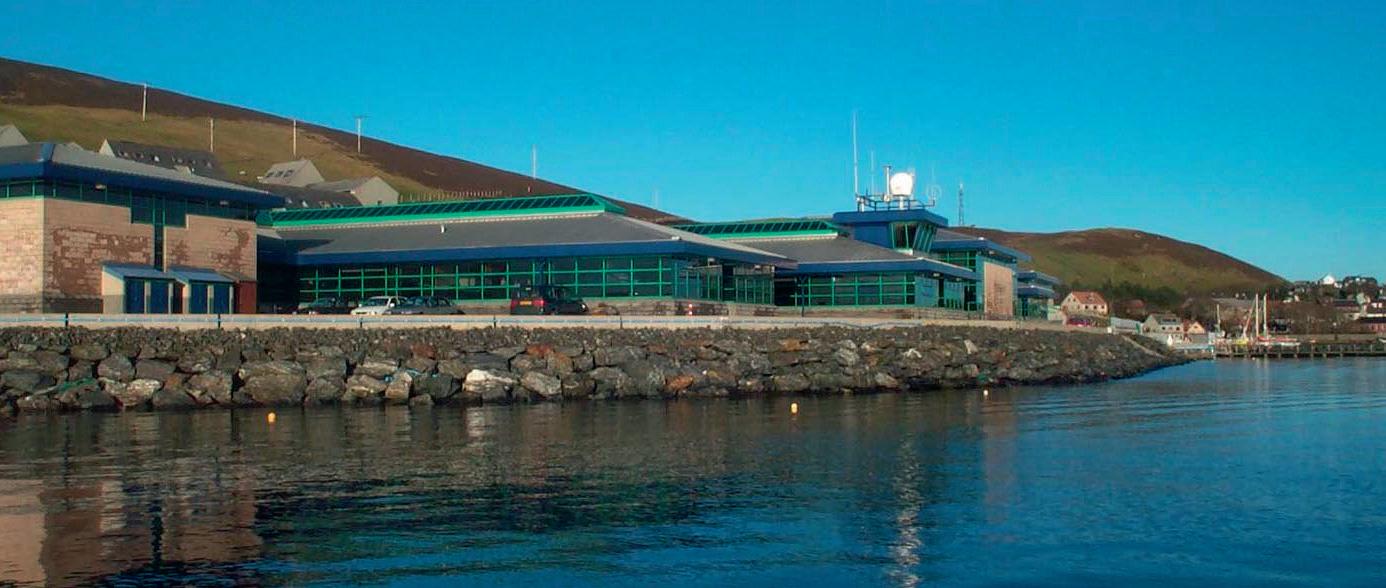
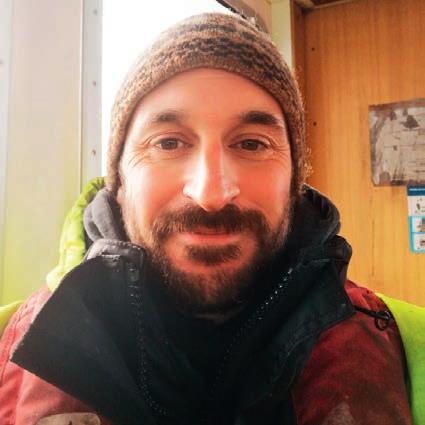
Shetland, is one of the leading centres for aquaculture training and educa� on. Stuart Fitzsimmons, sec� on leader for aquaculture training, says the Centre has adapted to Covid-10 restric� ons: “We have had good uptake for online courses to ensure students are comple� ng cer� fi cated courses such as fi sh welfare that they would normally a� end face to face training.
“We have adapted the MA/SVQ direct observa� on/evidence collec� on using the SQA [Sco� sh Qualifi ca� ons Authority] recommenda� ons for video evidence submission to ensure no student’s appren� ceships are delayed. We envisage recommencing site visits when travel restric� ons are eased and it is safe for staff and students.”
The Centre is affi liated with the University of the Highlands and Islands, and is in the process of merging with Shetland College UHI and Train Shetland to create a new ins� tu� on, Shetland UHI.
Fitzsimmons says: “There will be no changes to current aquaculture training provision – we are looking to ensure seamless transfer to the new college name, and the same staff and courses will be available. Going forward we will look to expand online course provision.”
It is an� cipated the new body will come into being, subject to Sco� sh government approval, later this year.
Fish farming is a popular industry for students at NAFC. Fitzsimmons says: “Aquaculture con� nues to be an excellent career choice for various age groups and off ers a great opportunity for people in remote areas. Despite Covid, the industry has been very busy and there has been good demand for new employees and training provision.”
The aquaculture sector in Norway is also fi nding increasing interest from applicants, a� er a period in which recruitment has been a challenge. For example, aquaculture technology fi rm Krüger Kaldnes recently received no less than 100 applica� ons from highly qualifi ed candidates for two new engineering posi� ons.
“It is not long ago that Norway was ‘stripped’ of engineers, and we had to recruit engineers from countries all over the world. So, this is defi nitely a confi rma� on that the seafood and aquaculture industry has become a genuine choice of career for an increasing number of people,” says Per Håkon Stenhaug, HR Manager of Krüger Kaldnes. FF
